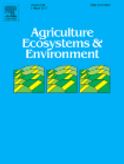High-altitude ecosystems shelter important reserves of biodiversity, water provision and soil organic carbon (SOC) stocks. Climate change, agricultural encroachment, overgrazing, and mining activities are endangering ecosystems sustainability, particularly in the high-Andean Puna. Increasing food demands in a region with limited agricultural land calls for agricultural intensification. Ecological intensification of agriculture is a framework for increasing agricultural productivity by fostering supporting and regulating ecosystem services (ES) while reducing negative environmental impacts. In this review we examine how agriculture use and disturb the provision of key ES in this ecoregion – food, wool and fiber provision, soil fertility, nutrient cycling, soil carbon sequestration, water provision and regulation, genetic resources, pest and disease control, pollination regulation and microclimate regulation. We also propose a set of technologies, practices and policies to preserve (or restore) the provision of these key ES: long fallowing, soil amendments, conservation tillage, rotational grazing, grassland ecological restoration, conservation of agrobiodiversity, modern irrigation and water harvesting, plant breeding, climate change mitigation schemes and payment for ecosystem services, and adapted traditional technologies.
Key ecosystem services and ecological intensification of agriculture in the tropical high-Andean Puna as affected by land-use and climate changes
Citation: Rolando, J.L.; Turin, C.; Ramirez, D.A.; Mares, V.; Monerris, J.; Quiroz, R. 2017. Key ecosystem services and ecological intensification of agriculture in the tropical high-Andean Puna as affected by land-use and climate changes. Agriculture, Ecosystems & Environment. (Netherlands). ISSN 0167-8809. 236:221-233.
2017-03-29
CLIMATE-SMART AGRICULTURE, CROP AND SYSTEMS SCIENCES CSS, CROP PROTECTION
journal_article

